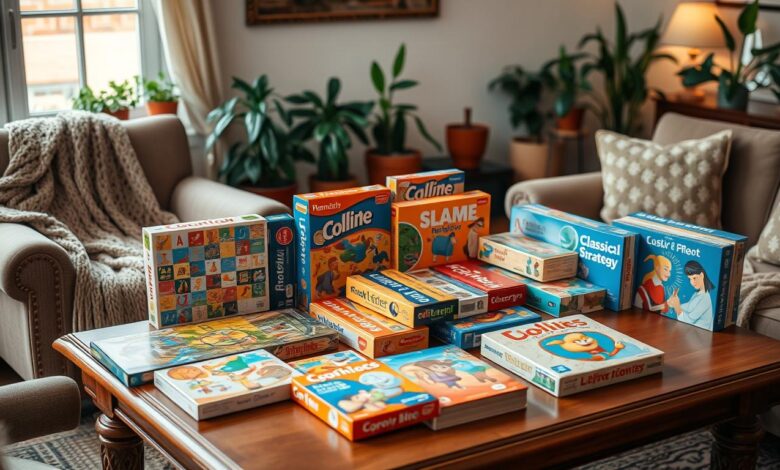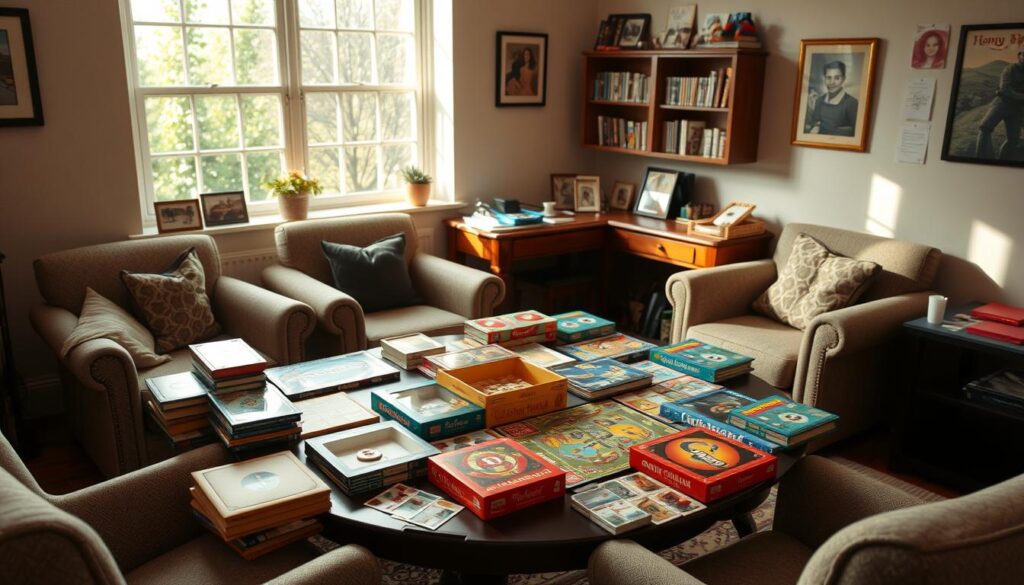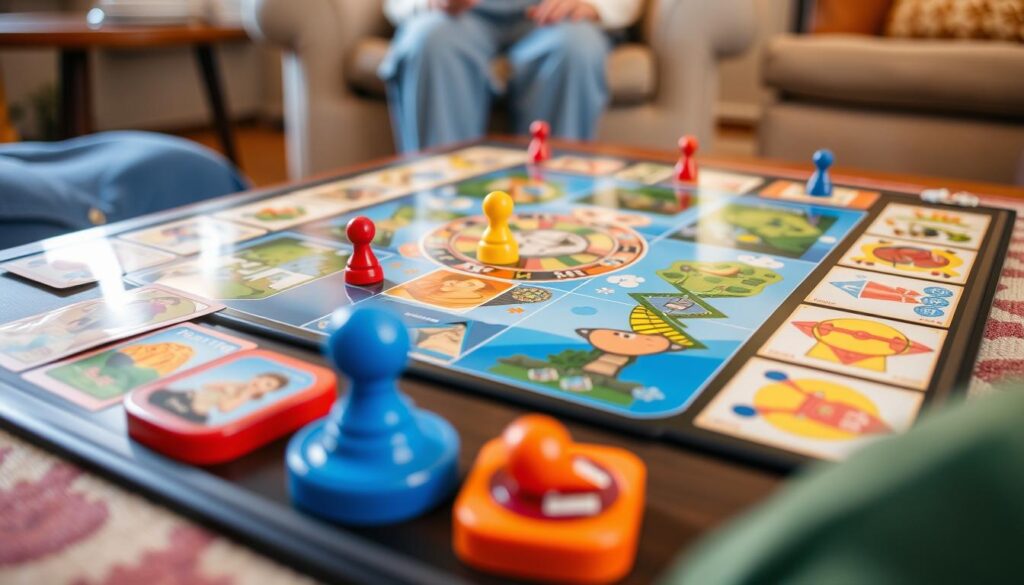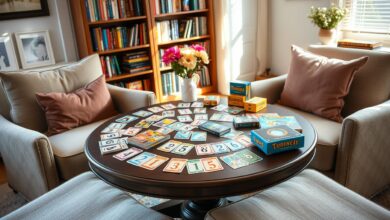Board Games for Dementia Patients: Mental Stimulation

Watching my grandmother lose her sharpness to dementia was heartbreaking. Her spark had faded, and she struggled to connect with the world. But, introducing simple board games changed everything.
These games, once seen as just fun, are now key in fighting cognitive decline. They bring back mental stimulation, memory, and joy. Playing games can even create new brain paths, helping slow down memory loss.
This guide shows how board games can be a big help for dementia patients. We’ll look at the science behind their benefits and find the best games. Our goal is to help caregivers and families use these games to improve lives.
Table of Contents
Understanding Dementia and Cognitive Decline
Dementia is a condition that makes it hard to remember, think, and speak. It gets worse over time. People with dementia face big challenges every day.
Types of Cognitive Functions Affected
Dementia affects many parts of the brain. This includes:
- Memory: Trouble remembering things or making new memories
- Attention and Concentration: Hard to stay focused or keep attention
- Language: Struggling to find words or understand what others say
- Visuospatial Skills: Trouble seeing and understanding visual information
- Executive Function: Problems with planning, solving problems, and making decisions
The Role of Mental Stimulation in Dementia Care
Mental activities are key in caring for people with dementia. Playing games can slow down memory loss. It helps keep the brain sharp for longer.
These activities challenge the brain. They help keep skills sharp and delay dementia symptoms.
Statistics and Current Research
About 6.2 million Americans 65 or older have Alzheimer’s disease. Research shows that healthy habits, like mental games, can slow dementia. Playing games may delay dementia onset by up to five years.
“Playing games is not just a fun pastime but can be a valuable tool in Alzheimer’s care, potentially slowing cognitive decline and improving overall well-being.”
Understanding dementia and its effects helps caregivers and doctors. They can find better ways to support those with dementia.
The Science Behind Brain Games and Cognitive Health
Playing board games can greatly improve your brain health. Research shows that brain fitness exercises boost memory, attention, and speed. These activities are key to keeping your mind sharp.
A 2019 study found that 16 weeks of “exergame” training improved working memory and executive function in older adults. Another study showed that cognitive stimulation through computers can increase brain gray matter. This might help keep your mind sharp longer.
Brain games work by strengthening neural pathways. This helps you remember things better and may slow down memory loss in early dementia.
“Engaging in brain-stimulating activities can help build up neural pathways, supporting knowledge retention and potentially delaying memory loss in early dementia.”
Research says that older adults with mild cognitive impairment who play word games do better. They have better memory, working memory, attention, and speed than those who don’t play as much.
Experts hope that doctors will start recommending brain games for those with mild cognitive impairment. They believe it can improve cognitive function and slow down dementia.
Benefits of Board Games for Dementia Patients
Board games bring many benefits to those with dementia. They help improve memory and recall. They also encourage social interaction and boost emotional well-being.
Memory Enhancement and Recall
Playing board games can sharpen memory, attention, and problem-solving skills. It can slow down dementia symptoms and enhance life quality.
Social Interaction Benefits
Board games are great for social interaction. They help dementia patients connect with others. This reduces feelings of loneliness and isolation.
Emotional Well-being Improvements
Games also improve emotional health. They offer a structured routine that reduces anxiety and confusion. Players feel a sense of accomplishment, boosting their mood and self-esteem.
Adding board games to care routines is beneficial. It supports social engagement, memory exercises, and emotional well-being for dementia patients.

“Engaging in cognitive activities such as puzzles and word games can enhance focus, problem-solving skills, and concentration levels in individuals with dementia.”
Selecting the Right Board Games for Different Stages of Dementia
Choosing the right board games for dementia patients is key to improving their mental health. As dementia progresses, the person’s mental abilities change. This means we need to pick games that fit their current needs.
In the early to middle stages, games that challenge the mind are best. These include word puzzles, jigsaw puzzles, and strategy games. They keep the mind sharp and make the person feel accomplished.
When dementia gets worse, simpler games are better. These might be classic card games, dice games, or activities that help remember things. The goal is to find games that match the person’s abilities, so they stay interested and not frustrated.
Using a variety of dementia-friendly games can help keep the mind active. It also improves the overall happiness of those with Alzheimer’s care. By choosing games that fit the person’s needs, caregivers can make a supportive and fun environment. This helps keep the mind sharp and encourages social interaction.
“Engaging in cognitive activities like board games can help create new brain neurons, which can slow the decline of cognition and memory related to dementia.”
- Word Puzzles
- Jigsaw Puzzles
- Strategy-based Games
- Classic Card Games
- Dice Games
- Memory-focused Activities
By carefully choosing board games that match the person’s abilities, caregivers can boost their sense of achievement. It also helps with social interaction and emotional well-being for those with dementia.
Popular Board Games and Their Therapeutic Value
Board games are great for keeping the mind sharp, especially for those with dementia. They offer a mix of fun and brain benefits. From old favorites to games that focus on memory, they help in many ways.
Traditional Board Games
Games like Monopoly and Chess slow down cognitive decline in seniors. They challenge players to think strategically and solve problems. This is especially good for those in the early stages of dementia.
Memory-Specific Games
Games like word puzzles and crosswords are great for memory. They keep the brain active by asking players to remember and use information. This can help slow down memory loss in dementia patients.
Strategy-Based Options
Mahjong is another game that helps older adults with mild cognitive impairment. It requires players to plan ahead, remember patterns, and make smart decisions. This gives dementia patients a good workout for their brains.
“Playing just five minutes of puzzle games every day has been shown to boost brain function, prevent cognitive decline, and ward off dementia if played regularly.”
Classic card games like Bridge and Go Fish also improve cognitive function in seniors. They work on memory, reasoning, and problem-solving. This makes them a great choice for dementia patients looking for a cognitive challenge.
Call to Mind: A Specialized Game for Dementia Care
Finding fun and helpful activities for people with dementia is key to their happiness. Call to Mind is a game made just for this purpose. It was created by Laura Templeton over 20 years.
Call to Mind is a board game that helps bring back memories and starts conversations. It costs $49.95 and comes with everything needed for a game night. This includes a board, spinner, 200 question cards, and more.
People say playing for 45 minutes is perfect. Two to four can play together. It has a 5-star rating from 17 reviews, showing it’s great for those who don’t talk much.
“This game has been a game-changer for our family. It has helped my grandmother, who has dementia, to open up and share memories we never knew about. The questions prompt such meaningful conversations, and we all leave feeling closer and more connected.”
Call to Mind does more than just keep minds sharp. Research shows it can also improve memory and slow down brain aging in older adults. This includes those with dementia.
Using Call to Mind in daily care can help people with dementia. It offers chances for socializing, feeling good emotionally, and keeping minds active. These are all important for their overall care.

Creating a Supportive Gaming Environment
Creating a supportive environment is key for the benefits of board games for those with dementia. It’s about making a calm, comfy space with no distractions. Here, caregivers can help and guide at the person’s own pace. It’s important to have good lighting, comfy seats, and easy-to-read game parts for a friendly gaming experience.
Caregivers are crucial in keeping a patient and encouraging vibe. This lets people with dementia enjoy games without feeling stressed or competitive. By focusing on caregiver support and using dementia-friendly games, you create a space for therapeutic activities and fun.
“Over four years, OuiSi has received hundreds of positive reviews from caregivers and dementia professionals, highlighting its effectiveness in dementia engagement.”
Games like OuiSi are different from regular board games. They are simple and easy to understand. This makes games more fun and accessible for those with cognitive decline.
- Prioritize a calm, comfortable, and distraction-free environment
- Ensure proper lighting, seating, and easily readable game components
- Maintain a patient and encouraging attitude as a caregiver
- Foster a sense of accomplishment and enjoyment, rather than competition
- Utilize dementia-friendly games that are simple and intuitive
By setting up a supportive gaming space, you help people with dementia enjoy many benefits. This includes cognitive, social, and emotional gains from playing games. It also helps caregivers give a caring and enriching experience, boosting the well-being of those with dementia.
Incorporating Board Games into Daily Care Routines
Adding board games to daily routines for those with dementia offers many benefits. It keeps their minds active and engaged. Playing games when they’re most alert, like in the morning or early afternoon, makes a big difference.
Best Times for Gaming Sessions
Experts say play games when the person with dementia is most awake. This is usually in the morning or early afternoon. It helps them stay focused and avoids confusion or tiredness later.
Duration and Frequency Recommendations
- Games should last about 45 minutes for most people.
- Playing games a few times a week is good. It keeps their minds sharp and boosts their mood.
Caregiver Involvement Tips
- Caregiver involvement is crucial. They should support and encourage the player, adjusting the game as needed.
- Use games to start conversations and for reminiscence therapy.
- Choose games that match the person’s interests and hobbies. It makes playing more fun and engaging.
By adding board games to daily routines, caregivers can offer therapeutic activities. These activities support caregiver support and help with daily routines for those with dementia.
Alternative Brain-Stimulating Activities
Board games are great for cognitive stimulation in dementia patients. But, there are many other fun activities that can help too. These therapeutic activities keep the brain sharp, encourage socializing, and boost happiness.
Reading books, magazines, or newspapers is very good for the brain. It helps with understanding, remembering, and solving problems. Watching TV or listening to the radio also keeps the mind active with stories, trivia, and talks.
Getting creative through painting, drawing, or playing music is also beneficial. These activities not only challenge the brain but also touch on emotions and social connections. They make people feel proud and connected.
For those with more severe dementia, simple things like talking, looking at old photos, and listening to favorite music are still helpful. These activities can bring back memories, improve mood, and offer comfort and engagement.
It’s important to try different brain-stimulating activities that match the person’s interests and abilities. By doing so, caregivers can keep the mind active, engaged, and connected. This improves the life quality of those with dementia.
“Engaging in a range of cognitively stimulating activities can help maintain brain health and delay the progression of dementia.”
Research-Backed Evidence on Gaming Benefits
Many studies show that gaming can help with cognitive health in dementia patients. A 2019 study found that playing board games can lower dementia risk by 15%. It also found that these players are less likely to get depressed.
Research in the American Academy of Neurology journal showed that games can delay dementia by up to five years. While more research is needed, current evidence suggests that games can improve thinking, memory, and overall brain function in older adults.
Recent data shows that playing computer games often can lower dementia risk. People who play games a lot do better in memory and thinking skills. They also have more gray matter in the hippocampus, which is key for memory and navigation.
“Genetically determined high frequency of playing computer games was associated with a low risk of dementia.”
Gaming benefits go beyond just helping with dementia. About 40% of gamers are women, and at least 26% are over 50. This challenges old stereotypes. Exergames, which are games that get you moving, can motivate people to stay active. This is important for health and well-being.
As the world’s population ages, finding good ways to care for dementia becomes more urgent. The evidence on gaming’s cognitive benefits shows its potential in supporting healthy aging and delaying dementia.
Tips for Caregivers and Family Members
As a caregiver or family member of someone with dementia, you’re key in making board games fun. Be patient, empathetic, and supportive. It’s best to avoid arguments, as they can upset the person with dementia. Their tough behaviors aren’t about you.
Focus on enjoying the game, not winning or losing. Change the games to fit the person’s skills and likes. Make sure to encourage social engagement during play. This can make the experience better and help them remember things.
- Be patient and understanding – Dementia can make it hard for the person to understand or follow rules.
- Adapt the games to individual needs – Make rules simpler, use bigger pieces, or change the game to fit their abilities.
- Foster social interaction – Talk and share memories with the person during the game.
- Provide a supportive environment – Keep the mood light and fun, without criticism or arguments.
Using these caregiver support tips can make board games a great time for your loved one with dementia. Games can help keep their mind sharp, improve mood, and boost overall health.
“Playing board games with my mother has been a wonderful way to connect and stimulate her mind. I’ve seen her mood and cognitive function improve significantly since we started this routine.”
Conclusion
Board games are great for keeping minds sharp and bringing people together in dementia care. They can’t cure the disease, but they can help slow it down. They make life better and fun for both patients and caregivers.
These games do more than just help with thinking. They also make people feel better emotionally and help them connect with others. As more research shows how important mental activities are, using board games in daily routines is key.
Many studies show that board games are good for the brain. They help with memory, focus, and solving problems. Players see big improvements in their thinking, balance, and walking.
Games also make people feel happier and less anxious. This is because they boost serotonin levels. It’s clear that board games are very valuable in helping people with dementia.
As more people get into games like Bananagrams and Wordle, their potential in dementia care is obvious. By making games a part of daily life, caregivers and healthcare workers can make a big difference. They can improve the lives of those with dementia by keeping their minds active and their spirits high.
FAQ
What are the benefits of board games for dementia patients?
How can board games help with memory and cognitive function in dementia?
What types of board games are most beneficial for different stages of dementia?
How can caregivers and family members support board game activities for dementia patients?
What other brain-stimulating activities can complement the benefits of board games for dementia patients?
What is the research evidence on the cognitive benefits of board games for dementia patients?
Source Links
- Brain Games for Dementia: Examples and Why They Help – https://www.healthline.com/health/alzheimers-dementia/memory-games-for-dementia
- Different Board Games That are Great for Seniors – https://www.havenhealthaz.com/blog/board-games-for-seniors/
- Top Friendly Board Games for Seniors and Cognitive Benefits – Westmont Living – https://westmontliving.com/blog/westmont-of-fresno/memory-care/top-friendly-board-games-for-seniors-and-cognitive-benefits/
- Games, Puzzles And Reading Can Slow Cognitive Decline In The Elderly — Even In Those With Mild Cognitive Impairment – https://today.tamu.edu/2024/09/10/games-puzzles-and-reading-can-slow-cognitive-decline-in-the-elderly-even-in-those-with-mild-cognitive-impairment/
- Co‐producing a board game to learn and engage about dementia inequalities: First impacts on knowledge in the general population – https://pmc.ncbi.nlm.nih.gov/articles/PMC10792594/
- Feasibility and effect of cognitive-based board game and multi-component exercise interventions on older adults with dementia – https://pmc.ncbi.nlm.nih.gov/articles/PMC11466138/
- Cognitive decline prevention: Brain stimulation and lifestyle choices – Mayo Clinic Press – https://mcpress.mayoclinic.org/healthy-brain/preventing-congnitive-decline-with-brain-exercises/
- Improve your brain health by changing your routines – https://www.dementiamap.com/enhancing-cognitive-health-the-benefits-of-brain-games-for-seniors-with-dementia/
- Games for Elderly with Dementia – https://www.ultimatecareny.com/resources/games-for-elderly-with-dementia
- Games to Play with Dementia Patients – https://www.ultimatecareny.com/resources/games-to-play-with-dementia-patients
- 50+ Dementia Friendly Board Games: Fun Games for Elderly Family Bonding – The Tabletop Family – https://thetabletopfamily.com/50-dementia-friendly-board-games-fun-games-for-elderly-family-bonding/
- Conversation Game | Board Game for Dementia and Alzheimer’s Patients | A Simple Conversation Starter Activity | Makes a Great Gift or Perfect for Memory Care Residents | Call to Mind | AlzStore – https://www.alzstore.com/conversation-game-for-dementia-p/h012.htm?srsltid=AfmBOoqiOdpM7pVFKqj9xXQlFT5AOQc38D53aLL_dZTNsSObgKQVa38U
- ‘All About Us’ Conversation Game | Board Game for Dementia and Alzheimer’s Patients | A Simple Conversation Starter Activity | Makes a Great Gift or Perfect for Memory Care Residents | Relish | AlzStore – https://www.alzstore.com/memory-activity-game-for-dementia-p/h014.htm?srsltid=AfmBOooT_M7GZtTbV9FNlJ3NRnZEeBEbbS-lTv1OzG6DjfXWPV-ogRW0
- 19 Engaging Activities for People With Dementia at Home – https://www.aplaceformom.com/caregiver-resources/articles/dementia-activities
- 51 Great Games for Seniors & Elderly People | Lottie – https://lottie.org/carecollective/games-for-elderly-people/
- Conversation Game | Board Game for Dementia and Alzheimer’s Patients | A Simple Conversation Starter Activity | Makes a Great Gift or Perfect for Memory Care Residents | Call to Mind | AlzStore – https://www.alzstore.com/conversation-game-for-dementia-p/h012.htm?srsltid=AfmBOopZPeFwFphd0RNXFpcZOIV9NNXrODIi1I_JYDYViRARwz80gSvm
- Games for Seniors with Dementia – https://www.ultimatecareny.com/resources/games-for-seniors-with-dementia
- 32 Therapeutic Activities for Patients with Dementia – https://neuraleffects.com/blog/therapeutic-activities-for-dementia-patients/
- OuiSi and Dementia – https://shop.ouisi.co/blogs/how-we-see-a-blog-on-connection/ouisi-and-dementia?srsltid=AfmBOorXD71AZ9tCOcKUmkWs5Cj9D2Esd2xQ-xUyBsFSCFHyjnx8hu9s
- How to Design Activities for People with Dementia – https://www.pegasusseniorliving.com/pegasus-landing-of-chisholm-trail/blog/2024/11/27/activities-for-people-with-dementia-ideas-resources-near-you/
- Adapting Activities for People With Alzheimer’s Disease – https://www.nia.nih.gov/health/alzheimers-caregiving/adapting-activities-people-alzheimers-disease
- 60 Activities and Games for Adults with Dementia: A Comprehensive Guide – https://www.onelifeseniorliving.com/blog/activities-games-dementia-patients
- Benefits of Board Games for Seniors | Holbrook Decatur – https://holbrooklife.com/blog/senior-lifestyle/benefits-of-board-games-for-seniors/
- 5 Types of Brain Stimulating Activities for the Elderly – https://westmorelandrehab.com/brain-stimulating-activities-for-elderly/
- Dementia, Memory Care, and Assisted Living options – Senex Memory Advisors – https://www.senexmemory.com/blog/cognitive-stimulation-activities-for-dementia-patients
- Associations of computer gaming with incident dementia, cognitive functions, and brain structure: a prospective cohort study and Mendelian randomization analysis – Alzheimer’s Research & Therapy – https://alzres.biomedcentral.com/articles/10.1186/s13195-024-01496-7
- Video Gaming in Older People: What Are the Implications for Cognitive Functions? – https://pmc.ncbi.nlm.nih.gov/articles/PMC11274634/
- Validation and comparison of virtual reality and 3D mobile games for cognitive assessment against ACE-III in 82 young participants – Scientific Reports – https://www.nature.com/articles/s41598-024-75065-1
- Games for seniors with dementia: Expert-approved picks to boost their well-being – https://www.care.com/c/games-for-seniors-with-dementia/
- ‘All About Us’ Conversation Game | Board Game for Dementia and Alzheimer’s Patients | A Simple Conversation Starter Activity | Makes a Great Gift or Perfect for Memory Care Residents | Relish | AlzStore – https://www.alzstore.com/memory-activity-game-for-dementia-p/h014.htm?srsltid=AfmBOopwZpe_EDFDPe2Qn_sQXCL83xkzW6NCU2qNH2KWzE4gN8kPTOAn
- Effects of board games on balance in association with cognition in community-dwelling older adults – Journal of Musculoskeletal Surgery and Research – https://journalmsr.com/effects-of-board-games-on-balance-in-association-with-cognition-in-community-dwelling-older-adults/
- Word Puzzles and Board Games Boost Brain Health – https://www.psychologytoday.com/intl/blog/the-full-picture/202412/word-puzzles-and-board-games-boost-brain-health




